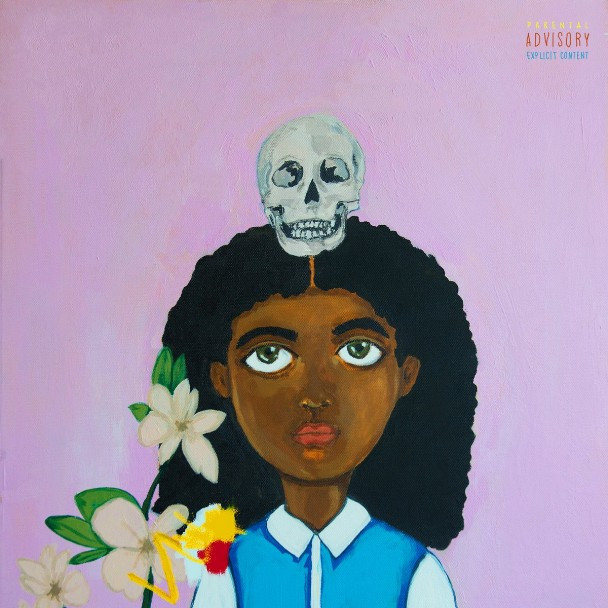Fatimah Warner, better known as Noname, constructs her own unique world of feeling with her debut mixtape Telefone—a long-awaited statement from one of Chicago’s finest emerging talents that finds itself yearning to playfully capture the abstract between life and death.
Noname began her career cutting her teeth at Chicago art hubs YOUmedia and Louder than a Bomb, but became a breakout hip-hop artist in her own right following her standout verse on Chance the Rapper’s “Lost.” On this mixtape she asserts her poetic mastery with soft-spoken rhymes and songs that vividly illustrate her world: lyrics portray her surroundings as full of despair and desolation, even as instrumentals maintain a buoyant atmosphere of glitz and glitter. By creating a musical world that balances between life and death, Noname calls attention to the correlated beauty of both. “All my n——s is casket pretty/ Ain’t no one safe in this happy city,” she says on “Casket Pretty,” mediating a blatantly dark subject matter with subtle reminders of the city’s bliss.
While Noname does address citywide and sometimes worldwide issues, the way she compresses them into personal anecdotes broadens the emotional range of the tape, presenting loss as more than mere tragedy. On tracks like “Casket Pretty” and “Shadow Man,” the raw lyrical exposition of her chosen topics, when cushioned by flamboyant instrumentals, allows the heaviness to scan as relatable.
On many tracks,Telefone feels hopeless, but Noname’s lyrics and music also carry the listener to moments where it feels like her hopes couldn’t be higher. “Casket Pretty” and the tape’s opener “Yesterday” reveal a fascination with the beginnings of adulthood, when one’s mistakes suddenly have the potential to become lasting. “Diddy Bop,” on the contrary, travels to days of childish bewilderment and the music of P. Diddy. On a feature verse, Raury says, “Happily making my accident/ Mama gon’ whoop on my ass again.” and Noname shares similar experiences—her youthful missteps were also met with a belt, but not without the reassurance of love: “For stealing that twenty dollars like ‘baby, just ask me’/ Mama say she love, love, loved us.”
On “Yesterday,” Noname expresses feelings of debased nostalgia in light of the loss of Brother Mike, an influential Chicago poet whose impact on the city’s hip-hop scene is everlasting. “Me missing brother Mike, like something heavy/ Me heart just wasn’t ready/ I wish I was a kid again,” she says, But even as she grieves, Noname refuses to let her grief obscure what Brother Mike taught her: rather, the visions and memories of him soften the loss and ignite reassurance in times of doubt. “When the sun is going down/ When the dark is out to stay/ I picture your smile, like it was yesterday.” Here she adds yet more nuance to the mixtape’s treatment of loss, expanding its emotional horizons beyond mere tragedy.
The interplay between the tape’s ideas constitutes an existential push-pull, with acceptance and contentment emerging as themes as Noname searches for self-worth. “Forever” is an uplifting ode to belief as Noname attempts to accept herself despite high aspirations, “I’m trying to re-imagine abracadabra for poverty/ Like poof I made it disappear/ Proof I’m made of happiness.” On “Forever” and at other points throughout the tape, she adopts the mantra of “everything is everything” from Lauryn Hill, who herself claimed simply that, “change, it comes eventually.” Despite her feelings of powerlessness in a bleak world, her missed opportunities on “Reality Check” and feelings of unrequited love on “Freedom Interlude,” Noname still manages to find light within and around herself.
Noname’s peak as a wordsmith comes with “Bye Bye Baby,” a personified narrative of an abortion. In the Bible, Exodus 3:8 finds God promising the Israelites liberation from slavery in Egypt and deliverance to a spacious land flowing with milk and honey: Noname spins this into a parable for child care, intoning, “My baby need some milk and honey,” itself an allegory for a home birth control remedy. She presents this first from a mother’s perspective, then allows herself to speak as the unborn child in the second verse. To come to terms with her decision, she speaks through this baby to fulfill the absence of love: as Noname later said herself on Twitter, “I wanted to make a song that brought love into the narrative of abortion.” It’s a heartbroken sentiment that still manages to depict optimism within despondence.
To Noname, death is not final, nor is it fearful—rather, by portraying the beauty that lies within and around it, she transforms loss into something blissful and worth exploring, despite the pain that comes with it.



just wanted to be on the mailing list- this shit’s lit